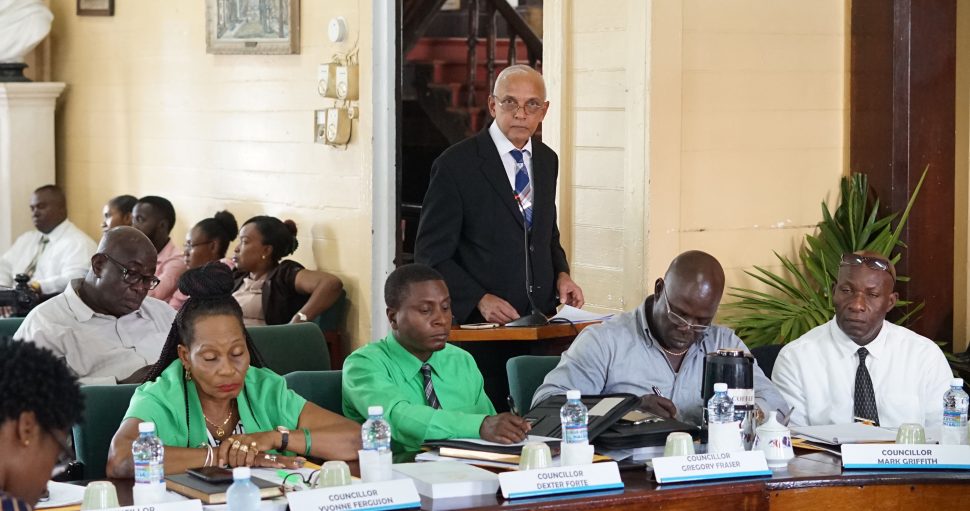Minister of Communities Ronald Bulkan has urged the new Georgetown Mayor and City Council to commit to ensuring the proper management of the city and to closely monitor the actions of the administration in the implementation of their decisions and programmes.
“No pressure, but all eyes are on not only the Mayor but the entire council as to how it will tackle the age-old problems that continue to beset the city,” Bulkan observed while speaking on behalf of President David Granger at the Council’s inauguration yesterday.
Bulkan noted that the inauguration of the new council presents a great opportunity to hit the “reset button” on the way in which the city is governed and he stressed that while the jurisdictions of the political arm, led by the Mayor, and the administrative arm, led by the Town Clerk, must be respected, councillors should not to shirk their oversight responsibility.
“Recent events have proven that the work of the entire council, good and bad, is brought into disrepute in the absence of checks and balances. Strict monitoring will ensure value for money, accountability and transparency. Citizens must not only hear as achievement that $200 million was expended but every expenditure must be felt by the ordinary man,” the minister advised while reminding that the role of the Finance Committee cannot be overstated, from the point of conceptualization, procurement and the execution of programmes.
This comment appears to be a direct reference to the findings of a Commission of Inquiry (CoI) established by the Local Government Commission (LGC). The CoI, led by retired judge Cecil Kennard, found that Town Clerk Royston King had been performing duties beyond his scope of work and violating the law by failing to seek permission from council for several financial decisions, including leasing of council property. Multi-million dollar contracts were also issued and sums paid to contractors without any recourse to the finance committee or proper procurement procedures as is required by law.
Cognisant of these recommendations, the minister has committed to working with relevant stakeholders to craft a code of conduct for administrative officials, such as Town Clerks, fine-tune procurement procedures and create guidelines for treating with council’s assets in accordance with the Municipal and District Councils Act.
According to Bulkan, grappling with issues facing the council, such as illegal vending, drainage, security, solid waste management, squatting on municipal reserves and zoning, while satisfying the expectations of citizens is not an easy task, particularly given the limited financial resources at the council’s disposal.
He, therefore, called for the development of a well-researched and reasoned plan that will prioritise and synchronise activities of the council to assist with the efficient use of council’s limited resources.
“An orderly city demands shrewd and inclusive planning. Programmes and projects of the council, whether small or large, must be contextualized within a long term development plan. It goes without saying that development is not ad hoc, each bit we do should contribute to a larger goal,” he stressed, while reminding that President Granger in his address to the previous council recommended that a National Capital Planning Commission be established as the institutional mechanism to aid such planning.
“His Excellency suggested that the work of the Commission should be to review the numerous plans which have been prepared over the years and to develop on your own, and in your own wisdom, a structured approach to urban renewal,” he said, while advising that the interest and welfare of all stakeholders should be incorporated into council’s plan, inclusive of a rethink of relations with the business community.
In this regard, the minister has expressed a willingness to facilitate a resuscitation of the Tripartite Committee established to promote dialogue between the council and the private sector so as to assist the council in ensuring an investor-friendly climate by taking steps to reduce unnecessary delays in the issuance of building permits and other necessary documentation.
Further, as recommended by the CoI, the ministry’s internal audit department will liaise with council to ensure going forward its account is audited yearly as prescribed by law.





